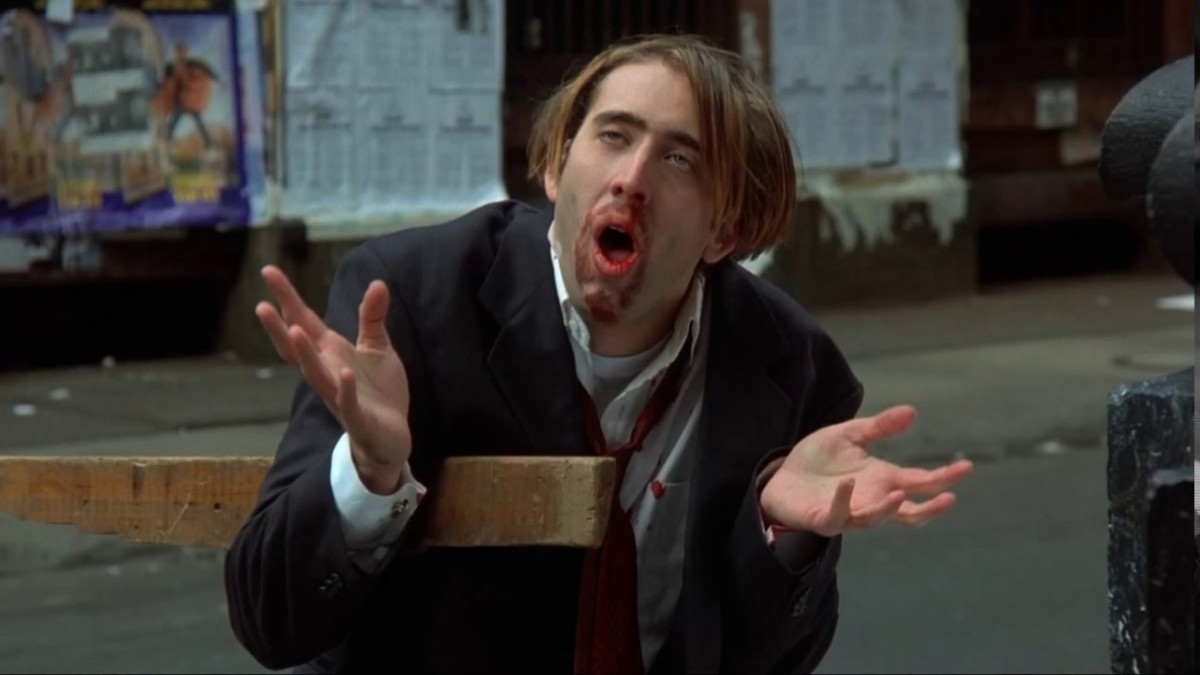Movie stars come and go. They get type-cast, hyped-up, blasted on social media, or reinvent themselves in endearing ways. Through it all is Nicolas Cage, whose career might just represent everything a film actor could ever dream of accomplishing.
According to Nicolas Cage, his performances in film productions aren’t acting. In an interview with Variety he states, “I don’t even like the word acting anymore because it implies lying in some way. I don’t act. I feel and I imagine and I channel.” If true, it would imply that Nicolas Cage doesn’t ever become the characters he plays on screen, all of them are him. Different versions, different emotions, different approaches, but still at their heart; Nicolas Cage.
This implies that Cage is a different type of performer compared with his peers. While they obsess over the transformation into a character who is not like themselves at all, Cage finds an aspect of his own personality and expands it for whatever the role requires. Despite the difference in technique, Cage’s approach works for him. It provides a flexibility and effortlessness of his performances which allow them to work in almost any situation. This, in turn, makes him a tremendous movie star. Maybe that’s an understatement. I would argue that there is no other person, living or not, who has come as close as Nicolas Cage’s dominance in being/existing as a movie star.
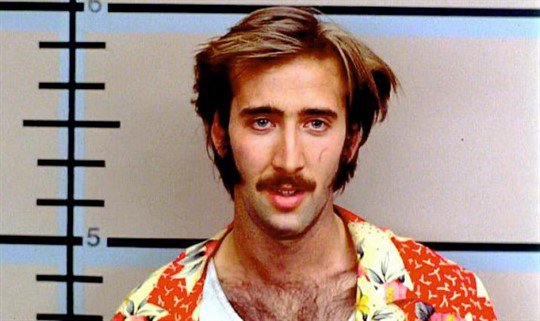
As a movie star, Nicolas Cage is sometimes bankable, sometimes niche, sometimes controversial, and sometimes boring. He has starred in major blockbusters almost as frequently as he has worked on independent films. He comes from a prominent Hollywood family, his brothers work in film and radio, his uncle is one of the most influential film directors of all time. He changed his stage name to prevent association and suggestion that he was being favored for work because of it. He has won an Academy Award for his acting, but is also tied for the dishonor of 5th-most Golden Raspberry award nominations.
In short, Cage has accomplished just about everything there is to accomplish as a movie star (including testing the waters of making films from behind the camera). Nobody else comes close. Certainly there are others who are better at specific things. Certainly there are those who become bigger celebrities, are more financially successful, and have won more awards. But Cage has shown up in the conversation for each of those things at least once during his career. His is an ability that has the potential to excel in any one category, but instead he spreads his chips around.
I’m not arguing that Nicolas Cage is the best actor. I am not saying he is the most convincing or consistent. At any given time during his career, even when he was at the top of his game, there have been other actors who have been more popular, higher-grossing, or more revered. But that doesn’t change the wide-spread grasp of Cage’s career and legacy. For every actor who has surpassed Cage in one particular area, there is another aspect of acting where Cage has them beat. But the aspect of Cage’s career that may be the most impressive is how his varied filmography seems to precede the ebbs and flows of the industry itself. In other words, Nicolas Cage has always been as cutting-edge as you can get.
Early in his career, Cage was a teenage heartthrob, trying to make a name for himself as an outsider equal to the talents of the early 80’s “Brat Pack”. Certainly he relied on his family’s connections, but soon found out he would be limited by them – hence the name change. In this era he found an edgier, more unique approach to these types of roles which elevated them beyond the typical ‘coming-of-age’ dramas that were popular at the time. Films like Valley Girl, Cotton Club, and Birdy received praise for Cage’s performances, but also demonstrated a sophisticated advancement of the young-person drama that would be expanded upon later in the 80’s in films like Stand by Me, St. Elmo’s Fire, or even Full Metal Jacket.
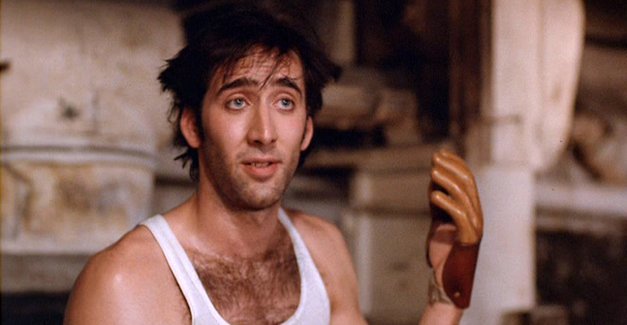
Cage managed to set himself apart from the Brat Pack and prevent himself from being type-cast by adding flair to his characters with his relentless energy. He helped establish this talent by working in comedies. Movies like Peggy Sue Got Married, Raising Arizona, and Moonstruck made Cage into a bonafide movie star. Specifically in Peggy Sue and Raising Arizona, Cage began to transform his performances into something more strange rather than play them straight. That helped to push these films to something more surreal and cartoonish and less crude than was typical for 80’s lighthearted comedy.
However, Cage couldn’t maintain his career’s upward trajectory. His increasingly bizarre performances divided critics and sank the box office hopes of many films. Several of his co-stars spoke out about his bizarre behavior on set. Instead of his techniques and personal problems being a novelty, they became a distraction and this resulted in a career slump in the early 90’s. Yet, Cage never failed to give us something interesting and unforgettable. The advent of social media and proliferation of memes has made films like Vampire’s Kiss and Wild at Heart cult classics because of those performances.
Slowly he figured out how to channel his energy in a more productive manner. This allowed him to achieve the highest professional accolade of his career, an Academy Award win for Best Actor for his performance in Leaving Las Vegas in 1995. This put Cage on the map again and led directly to the most successful period of his career. In fact, Cage seemed to hit a nerve playing off-kilter weirdos at exactly the right time.
Blockbuster action films were reborn in the mid 90’s and Cage found himself riding the wave. The key to it was to make Cage either a criminal or a law enforcement role, or both. These types of roles seemed to make his energy more palatable to mainstream audiences. In a 5-year period of movies like Kiss of Death, The Rock, Gone in 60 Seconds, Face/Off, Con Air, and arguably 8mm Cage’s star as a Hollywood actor was as bright as ever.
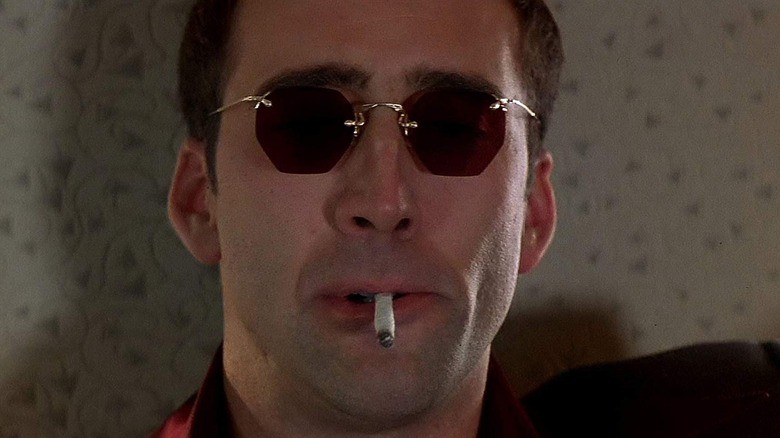
Yet, just as he approached the stratosphere of acting, Cage did another abrupt turn; he transitioned to more traditional, and tragic dramas. Films like Captain Corelli’s Mandolin, Adaptation, and later World Trade Center represented a more grounded version of Nicolas Cage as an actor. Interestingly he seemed to gravitate towards more neurotic performances, capturing the sense of paranoia in post 9/11 America. FIlms like Matchstick Men, National Treasure, Lord of War and The Weatherman had main characters in the midst of personal crises or large-scale conspiracies.
National Treasure seems like the closest Cage ever got to being a mainstream action/adventure hero. The success of this film lead him to be cast in a number of similarly adventurous blockbusters, but with diminishing returns (Ghost Rider, Next, Bangkok Dangerous, Knowing). The poor reception of these films resulted in a significant decline of Cage’s star power. It wouldn’t be until 2011’s Kick Ass that he would find another role which resonated well with mainstream audiences. Even then, Cage’s attempts to cash in on the burgeoning superhero genre didn’t catch on. He spent most of the remainder of the 2010’s starring in low-budget action or crime thrillers, several of them being direct-to-video.
Recently Cage’s career has been turned up another level. He has been incredibly prolific as of late, featuring in 24(!) films in the last 5 years. His career has been reborn, not as the leading blockbuster star or dramatic tour-de-force of the past, but as a quirky character actor in weird action, drama, and horror films. From Lovecraftian horror, to sci-fi martial arts, to terrorizing westerns, as well as lending his voice to hit animated feature films – Cage has experienced the second major revival of his career. He even got a chance to portray himself in The Unbearable Weight of Massive Talent, the most emphatic proof of his stratospheric star-power to date.
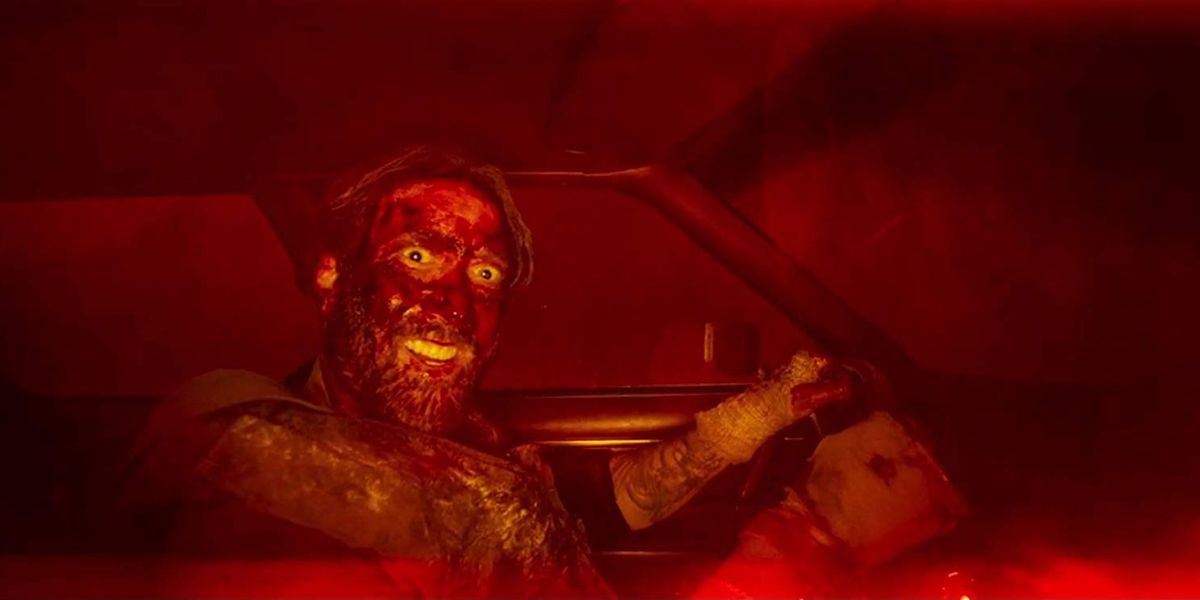
How many other major actors have gone through not one, but two career slumps to be able to reinvent themselves each time and come back more in-demand than ever? How many actors have been both derided for their quirky performances and celebrated because of them? It seems like every time there is criticism towards a Nicolas Cage performance, there is equal support in his favor. The man has been chastised by his co-stars as being difficult to work with, there are countless stories of his weird techniques, he has suffered terrible box-office defeats, he has had his struggles both on screen and off. And yet, it all seems to add to his appeal as an actor and a movie star.
Cage’s career is simply without equal in the history of cinema. He has accomplished all of the highs and lows, elevated himself to super-stardom and disgraced with being the laughing stock of Hollywood. He has been multiple vampires, an ambulance driver, a treasure hunter, many con artists, thieves, a corrupt cop, an angel, an alpaca farmer, a chemical weapons specialist, magicians, a sorcerer, a caveman, various wanderers, super heroes, psychopaths, a knight, and even a professional athlete, to name just a few. He is traditional Hollywood royalty, but made his own path in a way that is probably more memorable and iconic than anything his predecessors have ever done, or anyone after him could ever hope to accomplish. All of this makes Cage the ultimate movie star – if there is one person who can define everything that encompasses such a career, it is Cage.
